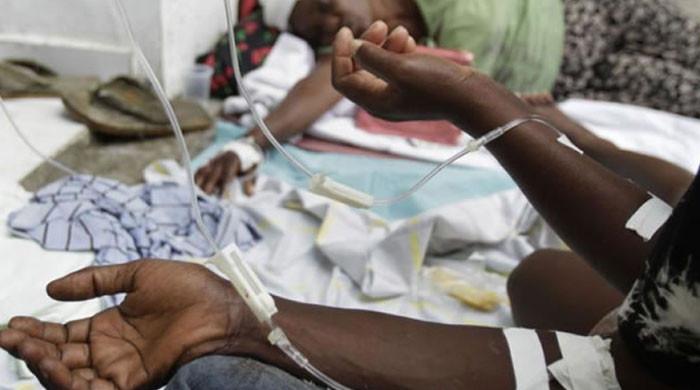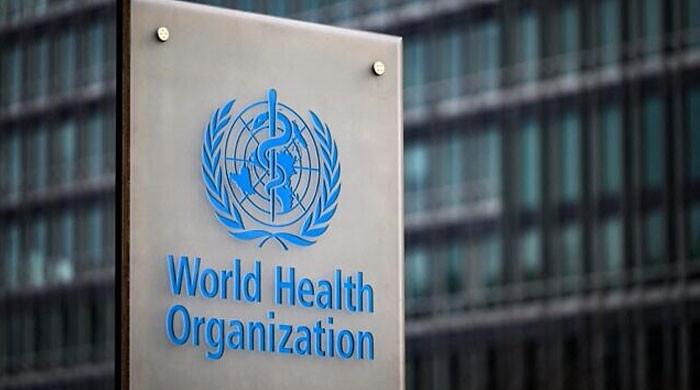WHO sounds alarm over alarming birth-related deaths in Pakistan
Govt's inaction to urgently invest in maternal and newborn health threatens country's future, warns WHO
April 08, 2025

ISLAMABAD/UNITED NATIONS: Every day in Pakistan, around 675 infants under one month old and 27 mothers lose their lives due to preventable complications, leading to over 246,000 newborns and nearly 11,000 maternal deaths annually, according to the United Nations and the World Health Organisation (WHO)
On World Health Day 2025, these agencies urged the government and international partners to invest urgently in maternal and newborn health, warning that inaction jeopardises the nation's future.
The WHO reported that Pakistan also faces over 190,000 stillbirths annually, primarily due to treatable conditions such as postpartum haemorrhage, hypertensive disorders, infections, and complications from unsafe abortions.
These distressing figures place Pakistan among the top four countries — alongside Nigeria, DR Congo, and India — contributing to 47% of the estimated 260,000 global maternal deaths in 2023, according to a recent UN report.
"Every country needs healthy mothers and healthy newborns to have a prosperous future. Ending preventable maternal and newborn deaths is possible if we reinvigorate our efforts," said Dr Dapeng Luo, WHO representative in Pakistan.
"A single maternal or newborn death is one too many, and the cost of inaction is far greater than the cost of action."
The theme for this year's World Health Day, "Healthy beginnings, hopeful futures," underscores the critical importance of maternal and newborn health as a foundation for national development.
The WHO estimates that every $1 invested in maternal and newborn health yields a return of $9 to $20, making it one of the most impactful public health investments.
Despite some progress, Pakistan is still far from achieving the global Sustainable Development Goal (SDG) targets of reducing maternal mortality to 70 deaths per 100,000 live births and neonatal mortality to 12 per 1,000 live births by 2030.
Pakistan's maternal mortality ratio (MMR) has dropped from 276 in 2006 to 155 in 2024, and neonatal mortality has declined from 52 to 37.6 per 1,000 live births over the same period.
Stillbirths have also decreased from 39.8 per 1,000 births in 2000 to 27.5 in 2024. However, experts warn that progress has been uneven and fragile, particularly in rural and conflict-affected areas.
WHO notes that around 80% of Pakistan's population (190 million people) now lives in areas where neonatal tetanus is under control, defined as fewer than one case per 1,000 live births.
The disease has been eliminated in Punjab (2016), Sindh (December 2024), Islamabad Capital Territory and Pakistan-administered Kashmir (March 2025).
Still, significant gaps remain. Anaemia affects 41.7% of Pakistani women aged 15 to 49, and many continue to lack access to antenatal care, skilled birth attendants, emergency obstetric care, and postpartum support.
The COVID-19 pandemic further disrupted maternal health services, reducing access to institutional deliveries and lifesaving care, particularly in remote areas.
The UN report stresses that many maternal and newborn deaths could be prevented through investments in midwifery, family planning, nutrition, mental health, and women's education and empowerment. It also recommends restoring international funding and expanding domestic health budgets to rebuild essential services.
"A 15-year-old girl in Pakistan faces a lifetime risk of 1 in 80 of dying from maternal causes, compared to just 1 in 5,600 in high-income countries," the report warned.
Globally, maternal deaths have declined by 40% since 2000, but the current pace is far too slow to meet the 2030 targets. To get back on track, the global maternal mortality ratio must decline at an annual rate of 15%—ten times faster than the current pace.
WHO reaffirmed its commitment to support Pakistan in delivering "health for all, leaving no one behind" and emphasized that ensuring the survival of mothers and newborns is not only a public health priority but also a cornerstone of economic and social development.
Pakistan is ranked among four countries — together with Nigeria, India and the Democratic Republic of the Congo (DRC) — that accounted for nearly half of the estimated 260,000 maternal deaths worldwide in 2023, according to UN data released on Monday that has prompted stark warnings about the impact of cuts to aid funding by the United States and the United Kingdom.
Maternal deaths include those related to complications during childbirth or pregnancy, three UN agencies said in a joint report.
The trends in maternal mortality report was published by the UN Children's Fund (UNICEF), the World Health Organisation (WHO) and UN sexual and reproductive health agency UNFPA, in observance of World Health Day on April 7.
The report showed that Nigeria had the highest number of maternal deaths and accounted for more than a quarter (28.7%) of all estimated global maternal deaths in 2023, with approximately 75,000 deaths.
Only three other countries had more than 10,000 maternal deaths in 2023 — India and DRC tied at 19,000, with Pakistan totaling 11,000. India and DRC accounted for 7.2% each, while Pakistan accounted for 4.1% of global maternal deaths.
As aid funding cuts force countries to roll back vital services for maternal, newborn and child health, the UN agencies appeal for urgent action to prevent maternal deaths, particularly in humanitarian settings where numbers are already alarmingly high.
"While this report shows glimmers of hope, the data also highlights how dangerous pregnancy still is in much of the world today — despite the fact that solutions exist to prevent and treat the complications that cause the vast majority of maternal deaths," WHO Director-General Tedros Adhanom Ghebreyesus said in a statement.
"In addition to ensuring access to quality maternity care, it will be critical to strengthen the underlying health and reproductive rights of women and girls — factors that underpin their prospects of healthy outcomes during pregnancy and beyond."
The report also provides the first global account of the COVID-19 pandemic's impact on maternal survival.
An estimated 40,000 more women died due to pregnancy or childbirth in 2021, rising to 282,000 in 2022 and to 322,000 the following year.
This increase was linked not only to direct complications caused by COVID-19 but also to widespread interruptions to maternity services, highlighting the importance of ensuring that this care is available during pandemics and other emergencies.
"When a mother dies in pregnancy or childbirth, her baby's life is also at risk. Too often, both are lost to causes we know how to prevent," said UNICEF Executive Director Catherine Russell.
With global funding cuts putting more mums-to-be at risk, especially in the most fragile settings, "the world must urgently invest in midwives, nurses, and community health workers to ensure every mother and baby has a chance to survive and thrive," she added.
The report also highlights persistent inequalities between regions and countries, as well as uneven progress. With maternal mortality declining by around 40% between 2000 and 2023, sub-Saharan Africa achieved significant gains.
It was also among just three UN regions to see significant drops after 2015, with the others being Australia and New Zealand and Central and Southern Asia.
Yet, sub-Saharan Africa still accounted for approximately 70% of the global burden of maternal deaths in 2023 due to high rates of poverty and multiple conflicts.
Meanwhile, five regions saw progress stagnate after 2015: Northern Africa and Western Asia, Eastern and South-Eastern Asia, Oceania (excluding Australia and New Zealand), Europe and North America, and Latin America and the Caribbean.
Dr Natalia Kanem, UNFPA's Executive Director, upheld that access to quality maternal health services is a right, not a privilege. She stressed the urgent responsibility to build well-resourced health systems that safeguard the lives of pregnant women and newborns.
"By boosting supply chains, the midwifery workforce, and the disaggregated data needed to pinpoint those most at risk, we can and must end the tragedy of preventable maternal deaths and their enormous toll on families and societies," she said.
The report also highlighted the plight of pregnant women living in humanitarian emergencies, who face some of the highest risks globally. Nearly two-thirds of global maternal deaths now occur in countries affected by fragility or conflict.
Beyond ensuring critical services during pregnancy, childbirth and the postnatal period, the report emphasised the importance of efforts to enhance women's overall health by improving access to family planning services, as well as preventing underlying health conditions that increase risks, such as anaemia, malaria and non-communicable diseases.
Furthermore, the report underscored the need for ensuring that girls stay in school and that they and women have the knowledge and resources to protect their health.











